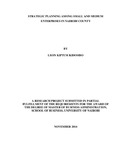| dc.description.abstract | Strategic frameworks and tools of analysis have been the subject of much academic debate
over the last three decades. Strategic planning is one of these frameworks and tool which
is a step-by-step process, ongoing and results-oriented roadmap that enables an
organisation to achieve its mission and vision. Numerous articles in academic publications
as well as practitioner-oriented journals have emphasized the importance of strategic
planning, not only for large firms but for small businesses as well. Despite the importance
of strategic planning in enabling businesses to handle challenges arising from their
environment and thus enhancing competitiveness, the reasons why some Small and
Medium Enterprises (SMEs) engage in strategic planning while others do not is generally
not well understood yet SMEs play a major role in economic development in almost all
world economies including Kenya. The purpose of the study was to investigate strategic
planning practices and the factors that influence strategic planning in SMEs in Kenya. The
study was a cross-sectional survey which used both qualitative and quantitative data where
primary was used. Primary data was gathered by way of questionnaires. The population of
the study were owners and key employees drawn from SMEs operating in Nairobi County.
The study sample was 387 SMEs where the owner or key employee was administered with
a questionnaire. Descriptive statistics was used to analyse the data and the results presented
in form of figures and tables. The study has found that majority of the SMEs surveyed had
adopted components of strategic planning to a great extent. The study found that SMEs had
in place visions, missions, goals and targets, and undertook business performance
evaluation. The study also found that specialised expertise (education, business training
and management expertise), size of firms (number of employees and annual turnover)
facilitated strategic planning. On the other hand lack of financial and time resource were
found to be barriers towards strategic planning in the SMEs surveyed. The study
recommends identification and categorisation of the factors influencing strategic planning
to enable enhancement of those that facilitate them and mitigation on the influence of the
barriers. The study also recommends increased investment into the SME sector in form of
technical and financial support. | en_US |

